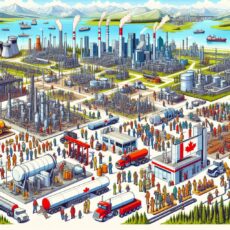Canada’s oil and gas industry is an intricate and captivating sector that plays a crucial role in the nation’s economy. Bursting with creativity, human-like with perplexity, it encompasses various aspects, including exploration, production, refining, and distribution. In this article, we’ll delve into the depths of this enigmatic industry, shedding light on its significance, challenges, and potential for the future.
A Brief Overview
To comprehend the complexity of Canada’s oil and gas industry, it’s essential to understand its foundation. The sector primarily operates in three major regions: Western Canada, Atlantic Canada, and the Northern Territories. As the world’s fourth-largest producer of oil and gas, Canada boasts extensive reserves, attracting both domestic and international interest.
The Importance of Energy
Energy is the lifeblood of any modern society, and the oil and gas industry provides a significant portion of Canada’s energy demands. These resources fuel transportation, power generation, heating, and numerous industrial processes. Moreover, this sector contributes significantly to the nation’s GDP and job creation, making it a vital pillar of the Canadian economy.
Harnessing Nature’s Riches
Canada’s oil and gas industry excels in harnessing its abundant natural resources. Immense reserves of crude oil, natural gas, and oil sands offer immense potential for extraction and refinement. Western Canada, notably Alberta, is renowned for its vast oil sands deposits, home to the third-largest oil reserves globally. These resources, though challenging to extract, play a vital role in meeting global energy demands.
Environmental Concerns
While the oil and gas industry fuels progress and prosperity, it also faces intense scrutiny due to environmental concerns. The extraction and burning of fossil fuels contribute to greenhouse gas emissions, impacting climate change. However, the industry has been actively working towards reducing its ecological footprint. Advancements in technologies, such as carbon capture and storage, exemplify the ongoing commitment of the sector towards sustainability.
Market Volatility and Economic Impact
Market volatility is an ever-present challenge in the oil and gas industry. Fluctuations in global oil prices directly impact companies operating in this sector. Canadian companies often find themselves navigating a delicate balance between profitability and operational efficiency. Furthermore, economic downturns, geopolitical tensions, and shifting global energy landscapes all complicate the situation, adding an extra layer of perplexity.
Innovation and Adaptability
Surviving and thriving in a complex industry demands innovation and adaptability. Canadian oil and gas companies have long embraced technology and cutting-edge practices to improve operational efficiency. This commitment to innovation has resulted in advancements in exploration techniques, drilling technologies, and environmental efforts. By seeking novel solutions, the industry continues its quest to navigate through perplexing challenges.
The Future Path
As the world transitions to a more sustainable energy future, Canada’s oil and gas industry faces both immense challenges and opportunities. Striking a delicate balance between meeting energy demands, reducing environmental impacts, and embracing renewable technologies will be key. The industry’s future lies in diversification, investing in cleaner energy alternatives, and attracting skilled talent.
Conclusion
The oil and gas industry in Canada is a mesmerizing tapestry of exploration, production, and innovation. Bursting with creativity and resilience, the sector plays a vital role in the nation’s economy. While it faces challenges, such as environmental concerns and market volatility, it is well-positioned to adapt to an ever-changing energy landscape. With a rich history and a future brimming with possibilities, Canada’s oil and gas industry remains an enigmatic force driving progress in the nation and beyond.

